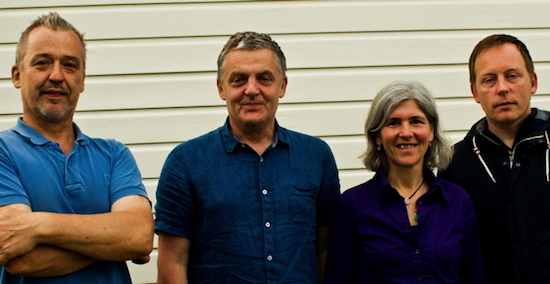The Ex are, without doubt, one of the greatest bands I know. Boasting a ridiculously strong back catalogue of nearly 40 years standing, they are a hypnotic live act, maybe without parallel, often morphing – through the sheer virtuosity of their playing – into something utterly, indefinably magical. They are often – and wrongly – regarded as a “Dutch punk band”. But The Ex are one of the most international and forward thinking acts about; soaking up ideas and experiences by way of numerous personnel changes, communal living, international collaborations, travels to different continents and sheer hard work.
As befits their lifestyle and collective ethos, the band are remarkably self-sufficient individuals, getting on with things in their own down-to-earth way, always inquisitive, never resting on their laurels. Guitarist Andy Moor once told me that, when he joined in 1990, he was amazed at their handiness, watching his colleagues mend their van like seasoned mechanics. This all-round handiness has seeped into their music. Their later LPs have developed over the years to become wildly achieving soundscapes, perfectly balanced and all-embracing in terms of headspace and execution.
As befits such an international band it’s been a drag hunting them down this last month or so. Gigs in Abu Dhabi, Ethiopia and various solo projects have meant the usual process – a visit to the Ex villa – has been traded in for phone calls, emails, quick chats over a coffee and a de-briefing before a gig in WORM, Rotterdam. Luckily the band provided plenty by way of mementoes and objets trouvé that give a clue as to what makes them tick. Maybe we could apply the epithet “practical-international” to this haul of items, as it seems to capture the band’s humour, all-embracing positivity and down-to-earth nature.
“The Snail”
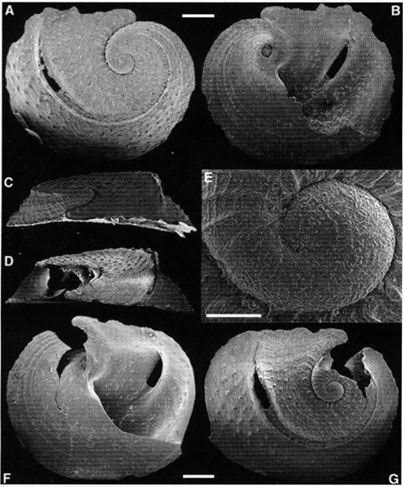
Terrie Hessels (guitar): We have a snail named after us! A tiny one. Only 0.2mm! But unique. It was found by professor Daniel L. Geiger in December 2000 off the coast of Easter Island in the sand, 20 metres underwater. He called it "Depressizona EXorum".
Prof. Geiger is an evolutionary biologist working on basal marine snails and Research Curator of Electron Microscopy and Malacology at the Department of Invertebrate Zoology of the Santa Barbara Museum of Natural History in Santa Barbara, USA. He is the leading authority on a sea snail species, Abalone. And a fan of The Ex!
The Pedal Plank
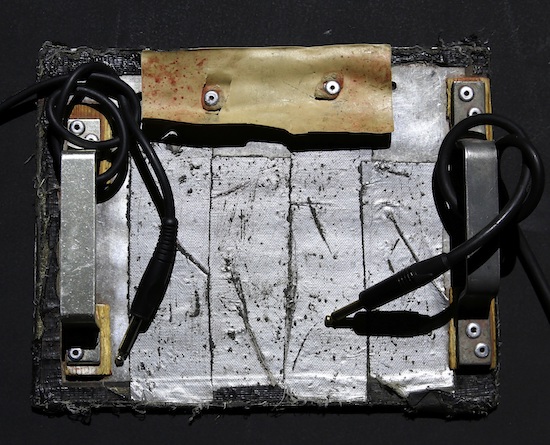
Andy Moor (guitar): This piece of aluminium with two handles was made for me by Terrie Ex in 1990 when I first moved to the Netherlands to join the band. It is one of the few objects that I still have from 28 years ago that I still use. I use it at nearly every gig. I put my tuner and EQ pedal in it and tie the leads to the handles. Before I had this plank I would always pull the plugs out of the pedals when running around onstage, which infuriated me as it often happened exactly at the moment when the music was supposed to be going wild or building to a crescendo, and instead my sound would disappear! So this was the perfect solution.
The brown rectangular piece of plastic you can see riveted to the top of the plate was the casing for my old tuner. It looks like it’s drenched in blood. And it would be if it was Terrie’s pedal plate… but this is fake blood from a theatre piece The Ex did with Alex D’Electrique many years ago. We played live during a theatre version of A Clockwork Orange and our role as members of Alex’s gang involved some hooligan activity.
I chose the plank (and my guitar) because they are both objects that I have continuously used from the very beginning of playing with both The Ex and Dog Faced Hermans. We don’t keep objects very long in general anymore; most things are “made to break” or become obsolete within five to ten years, especially nowadays. So I do feel a certain sense of triumph that two of the objects that have been an essential part of my livelihood for the last 37 years are still intact and in full use.
You once told me about how amazed you were by initially, by the practical nature of The Ex…
AM: The pedal plank does, for me, represent a very particular, “Anything is possible” spirit of problem solving. This was an attitude that I sensed as I soon as I arrived in The Netherlands; something that emerged from the autonomous kraak [squatting] scene. The credo was, “If your van’s fucked, fix it yourself. Get a manual, borrow a few tools and try at least to fix it yourself. Or, if you need a rehearsal space, build it yourself.” These were concepts I couldn’t conceive of before meeting The Ex and the people in their environment. We once built a rehearsal room from scratch: breeze blocks, insulation panels, carpets and a decent door. The lot. That spirit of determined DIY or DIT (whatever you prefer) has stayed with me and the pedal plank is a testament to that spirit and attitude. Yeeeeeeeah!
Ethiopian Injera (at Fenan Klein Afrika Restaurant, Amsterdam)

Katherina Rijcken-Bornefeld (drums): We are all fans of good, fresh, tasty food; preferably organic. A good example for me is Ethiopian Injera. Ethiopian food to me is very energising and healthy; tasty and with a lot of variety. Food is a very important thing in the history of The Ex. And we play better when we get inspiring food made by passionate cooks at a venue! I always enjoy it when we eat on a big long table all together, with the crew, the other bands etc., like it often happens in the venues in France. They are very good at this.
Traditionally Injera comes on a big plate and you don’t eat it on your own, but you share it with others. We often go and eat at a friend’s restaurant, the Ethiopian restaurant Fenan Klein Afrika in Amsterdam, normally before a concert, with musicians like King Ayishoba or also with our ‘jazz friends’ like Han Bennink, Mats Gustafsson, Paal Nilssen-Love, Ken Vandermark… they all love it! And it’s our favourite place for a meeting or a celebration.
The Ex have forged strong musical links with Ethiopia…
KRB: We’ve been many times to Ethiopia and love the culture there and met a lot of great people, we still work together with. We love diversity, we love healthy and we love colorful and that’s how the world should be. In the time we played with Getatchew Mekuria we also had the great dancer Melaku Belay performing with us. He used to dance in a club in Addis Ababa called Fendika. Now, he is the owner of that club and works together with other great musicians and dancers to preserve and share the rich heritage of Ethiopian culture in a non-commercial way. He started a band called Fendika and we have performed with them a lot in the few last years, actually very recently in Abu Dhabi. I think we, The Ex and Fendika share an openness for new adventures and improvisation. We all get a great deal of joy from it. Anyway we became very good friends and we love the network we have built up together because it allows an inspiring exchange.
A Red Guitar
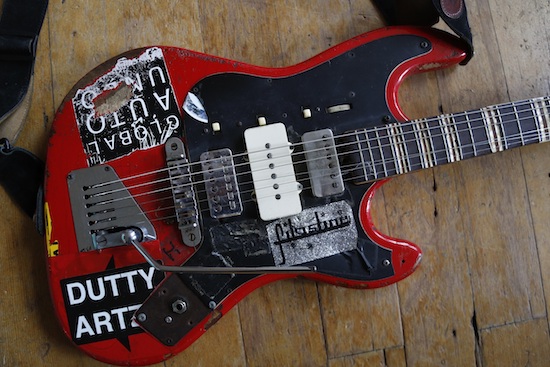
Andy Moor (guitar): This guitar is a Hofner Galaxy. I’m not sure from which year. (I’m not a collector so these facts don’t interest me so much.) It’s been repaired a lot. I bought this guitar for 100 quid from Colin Mclean of Dog Faced Hermans when we started playing music together in Edinburgh in 1985. He had a bass and a guitar and I had nothing. We were called Volunteer Slavery then, we hit oil drums a lot and played lots of other drums. Colin and I switched between guitar and bass until we realised our best songs were the ones when Colin played bass and I played guitar. I would recommend this strategy to any new band just starting out to find out what works best, by the way! In 1990 I joined The Ex and travelled to Tallinn and Moscow with them in a giant old bus. It was an incredible trip; we played with a band from Tallinn called Ne Zhdali. In Moscow we played at the giant Stalin-built university building, where a young guy approached me in the dressing room and asked me if I would give him my guitar strings after the concert, as strings were very hard to get in Russia at this time. I said yes and told him to meet me back in the dressing room after the concert. I never saw him again but he decided to take the strings anyway without detaching them from my guitar! I was very sad to have that guitar stolen.
I travel a lot and I lose a lot of things when I travel and mostly don’t care too much about it as I’m not attached to material objects in general… but this guitar was an exception. I finished the tour playing another guitar. Later Leonid Soybelman the singer of Ne Zhdali said he would ask around to see if it had turned up on the black market or somewhere else in the music scene in Moscow. A year later Ne Zhdali came to Amsterdam to play some concerts and Leonid came to meet us holding my guitar in his hand with a big smile! Only one string missing… incredible! He had found out who had stolen it and had gone along to his house. The guy’s mother answered the door and said her son was out, so Leonid asked her to check his bedroom and sure enough she came back with my guitar. Leonid had to pay her 30 roubles to get the guitar back. I still use this guitar, most recently downstairs in my house in zaal 100 in Amsterdam playing with the incredible drummer Onno Govaert. I use it especially for my free improvisation gigs. It’s indestructible and very heavy, with a great whammy bar.
The Ex Villa

Katherina Rijcken-Bornefeld (drums): The social aspect is very strong in The Ex, as well as a strong respect for other cultures. A lot of bands and other people from different countries have stayed at the villa, which used to be a squat in the old days. We even organised concerts there in the living room and outside in the garden. Sonic Youth stayed there in the early days and also the band Konono from the Democratic Republic of Congo stayed in the villa during their first visit to Holland. Last year we organised a big dinner for Syrian and Eritrean refugees. Some of them were musicians and it became a great evening with music, dancing and everything. Thanks to Terrie and his partner Emma (who cooks the most delicious food) who still live there now , the villa remains a great meeting place.
AKAI MPC 1000
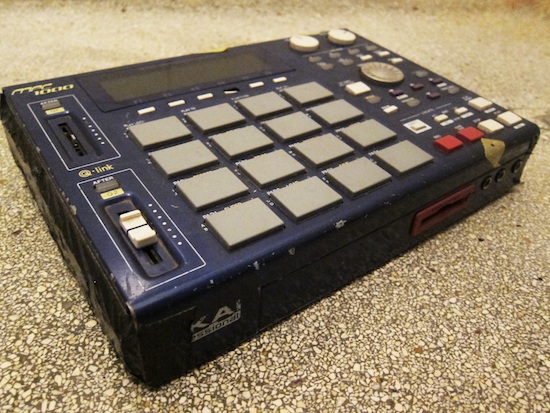
Arnold de Boer (vocals): When Terrie, Kat and Andy asked me to join The Ex they wanted me with guitar and were not against me using the MPC sampler either (those are my music utensils as a solo artist). I didn’t plan to go “all Brian Eno” in The Ex but I thought our songs could benefit from some sirens, car horns and explosions going off. And so it happened that the first song we made together as a four piece, called ‘Maybe I Was The Pilot’, contains the car horn sound of my old white VW Golf (that two years later got crushed by a tree).
We are all quite busy on stage; The Ex is a band in which all the musicians basically play all the time. I do alternate between singing and guitar playing sometimes, but I had to find a way to play the sampler too, somehow. We stationed it at the front of the stage, next to my monitor and vocal mic on the flight case of Andy’s amp which was the perfect height for me. I was able to hit the sample buttons with the head of my guitar. So far so good, I managed to get those car horns and other sounds out of the machine with pretty good timing. However, I had to take one other major chaos factor into account.
Next to the continuous sound there is also continuous movement on stage, especially from Terrie, who is always moving; left to right and back and forth. Now Terrie has made bumping and jostling others part of his playing. And Andy’s flight case had already had a long life. He joined The Ex in 1990 and I joined in 2009, so by then it was wobbly as hell. To keep the story short, hitting the buttons with a guitar head does not improve their sensitivity and Terrie kicked and bumped into the flightcase at least five times a gig, over a good 400 concerts. The MPC was launched from the stage into the audience and onto the venue floor about twenty times. Yes, the MPC is a very strong machine, it lasted for about six years in The Ex but in the 1000 Fryd in Aalborg, Denmark, it took a K.O. blow. Which does not mean it died. It is somehow still alive, but needing constant medical care. It is basically in a wheelchair.
Could you imagine an Ex gig where everyone COULDN’T move? In fact, has that ever happened?
ADB: Actually yes. I can’t speak about the first 30 years of The Ex but in 2015 I believe we played Swaf in Hoorn. Really small. We had to hold our guitars frontwards instead of sideways, and we were stepping each others’ toes. I do not think we will ever freeze on stage though, micro-movement will somehow persist.
The Ex Logo

Katherina Rijcken-Bornefeld (drums): The story of how the name The Ex came about is that it was the shortest name on a list of possible names for the band and it was chosen because it was an easy one to spray quickly on a wall! Which, as I am sure you know, was a common way to promote yourself [in the Netherlands] during those times.
For me ‘Ex’ in The Ex stands for something which has been the present a moment ago and in the next moment it is ‘ex-…’ Its core nature is to move on and not stay in the past. A bit like life does; always turning into a new form that is often refreshing, surprising, and adventurous.
I experience our music as something that is always developing. It develops with us, the people who produce it. Our music is not related to fashion, it doesn’t compromise, it has its own universe in its own circle, like the logo. And every song has its own story and lifetime after it is created. That’s why it is still exciting to make new songs and see them develop after 39 years. We never know ourselves what kind of songs we will make, as they’re all created by using improvisation as a starting point. Only afterwards do we shape them.
Besides that we love to play with adventurous musicians, who can help to push the music in another dimension. That’s why we had so many music projects in the past, like The Ex & Tom Cora, The Ex Orchestra, The Ex & Getatchew Mekuria, The Ex & Brass Unbound, and all the rest.
A Road In Owando, Congo (Plus An Orange Land Rover, Mr President And Some Ex Cassettes)
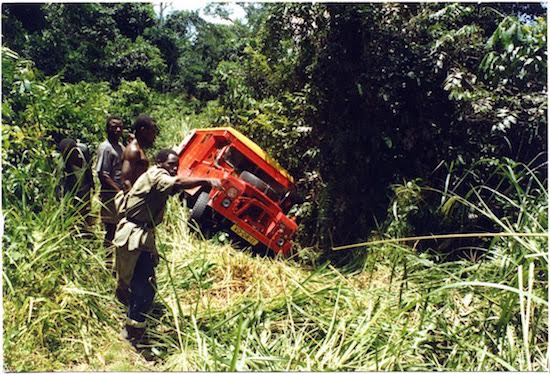
Terrie Hessels (guitar): It was in 1996 when Emma and me decided to go on a year-long trip through Africa in an old Land Rover. From Holland to the Cape-of-Good-Hope and back via the east coast. The Congo was not easy. Somehow we ended up on the only possible ‘road’, the N-1. It turned out that we were driving the first car along it in six years! We had to cut hundreds of trees away that were blocking the road and ended up driving over rotten bridges that we were nearly falling through. After three weeks of struggling through the jungle we reached the end and rested for a while, totally exhausted.
One morning we decided to move on. We drove until we were just outside the village Owando. To our surprise there was a brand new slippery bit of dyke with hundreds of people waiting there. We slid down and dozens of guys started pushing our car back on the road. It was a bit of road, some 500 metres long, specially built for the President of the Congo, who wanted to visit the village where he was born. And it turned out that, exactly at that moment he was on one end of the new road (with some 15 Toyotas flown in by helicopter) we were on the other end! We had to deal with lots of nervous military people waving machine-guns about. Not to mention people shouting and throwing mud. Total chaos! And the President slowly approaching. He was nervous too. But one by one the entourage passed us. Some of them almost touching our vehicle.
When finally they all passed, the guys who helped us back on the dyke started yelling: "L’argent!, l’argent!" Money! Money! Eh, of course you’re not going to open your wallet. We quickly got the idea of handing out some cassettes of The Ex that we had brought. I was standing outside and Emma handed me some ten copies of Kraaaaak [‘Squat’] and they were gone in a second. There were guys jumping on me, so I shouted, "Emma, ten more!" Again they were quickly gone. I was pushing them back, talking, and trying any possible distraction. After some 50 cassettes were handed out, things were calming down. And we could drive on. So, in this one village in Congo, Owando, almost every family must have an Ex cassette. Maybe we should go there again to see what impact it possibly had on the music-scene of Owando…
Pilot Fineliner

Arnold de Boer (vocals): I always have a black pen on me, a fineliner which is situated in the front right pocket of my trousers together with a few guitar picks and two bike keys. And in my bag I have a school book which I use for writing notes, ideas, lyrics, small sketches and drawings. But that bag with that school book is not always near me so I have a grand collection of small pieces of paper ripped from posters and magazines, cash receipts, beer mats, envelopes, flyers, napkins and toilet paper blemished with black ink.
Through the years I encounter more and more people who ask to borrow my pen because they fail to bring one for themselves. Number one in the statistics is Andy Moor. He is also notorious for making my pens disappear. Sometimes I find them back in a car or van seat or on the bar or behind an amp or next to a coffee machine but quite often I don’t, and I have the impression he eats them.
We recently played in Istanbul in a fairly modern building with a lot of office staff working there but it happened that I was the only person in the building with an actual pen. From a singer and guitarist I turned into a guard and a soldier, keeping tabs on my black fineliner and hunting it down as soon as it got out of sight. After the gig quite a few people wanted us to sign our CDs and LPs and unlike what often happens nowadays, when most people isolate themselves in the square metre around their phone, there was some sort of a group folk dance developing around my pen.
The folklore group dance? People danced whilst using the pen as a totemistic object?
ADB: It was after the concert and many people wanted The Pen to go on a journey, to find members of The Ex so they could sign the LPs and CDs. And we didn’t stay in one place, some of us getting a beer, some packing up stuff and some of us at the merch table, and moving from one task to another. So many variables, lots of people, a lot of movement and only my pen as the linking agent. So actually, somehow, yes, we started the dance and maybe one day a pen will become a totemistic object, like cash money. I imagine companies, institutions, governments and non-profit organisations soon be hanging huge signs on the walls that say: “We prefer typing over scribbling”, and rock clubs will put up signs at the back stage that say: “Bands please sign your commodities with your fingerprint”.
Some bands that play really loud are making a bit of extra cash at the merch desk with selling earplugs. I think I might start a small fineliner business, and mention on stage that we are happy to sign all purchased commodities.
The Plectrum
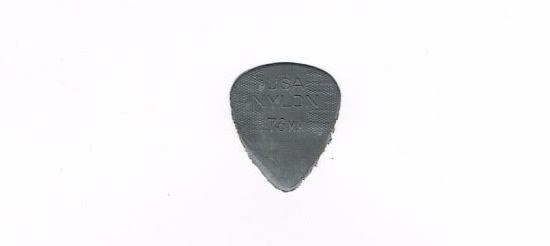
Terrie Hessels (guitar): This is a strange one. I didn’t really want to play guitar when we started The Ex in 1979. My father was a jazz-guitar fanatic with thousands of LPs, so by that point I’d had enough of hearing that instrument. But the others had already decided on drums and bass and Jos was writing lyrics, so he became the singer.
After the offer of a festival [the infamous punk festival-cum-riot in the sedate seaside town of Castricum where the band made their debut, 1979, Ed] we had to practise. I bought a guitar and some plectrums. And now, almost 40 years and more than 2000 concerts later, I still have this funny guitar, which I like, BUT I am also still stuck to this small triangular bit of plastic called a plectrum! Ridiculous!! USA Nylon .37mm. If you have a thinner one, the fingers become a blood-bath. With a thicker one I get cramp in my hand! So, I guess, for the rest of my life, I am stuck to this!
Although I try to use some alternatives…
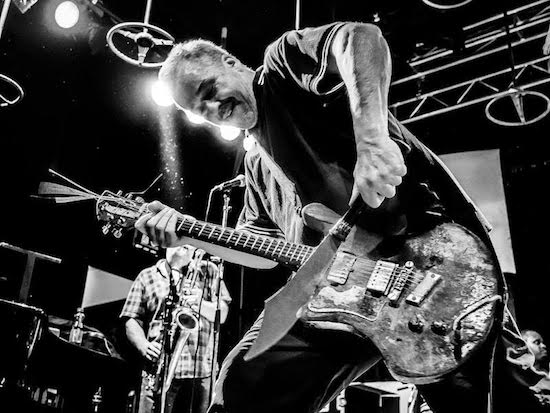
27 Passports, the new album by The Ex is out now on Ex Records

